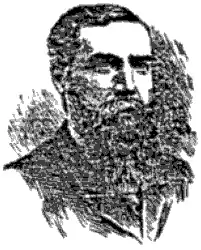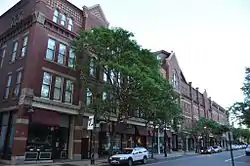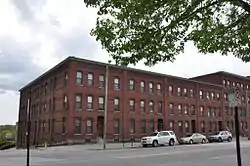John T. Fanning
John Thomas Fanning (1837–1911) was an American architect and hydraulic engineer. His contribution to fluid mechanics and hydraulic engineering is in the Fanning friction factor which is used by engineers in the present age to calculate the frictional pressures losses in flows inside pipes.[1]
John T. Fanning | |
|---|---|
 | |
| Born | John Thomas Fanning December 31, 1837 Norwich, Connecticut |
| Died | February 6, 1911 (aged 73) Minneapolis, Minnesota |
| Occupation | Architect, engineer |
| Spouse(s) | M. Louise Bensley (m. 1865) |
| Children | 3 |
| Signature | |
 | |
Biography
Fanning was born in Norwich, Connecticut on December 31, 1837.[2] In 1861 he enlisted, and participated in the United States Civil War with the rank of colonel, until his discharge. After the war, he returned to Norwich, soon establishing an office for the practice of engineering. There he married M. Louise Bensley on June 14, 1865, and they had three children.[2]
In 1872 he moved to Manchester, New Hampshire, to design that city's new municipal water system.[3] By 1877 he established a second office as an architect.[4] By 1885 he had begun to get several commissions in the west, warranting a move to Minneapolis. He served in many professional capacities as a hydraulic engineer, including consulting for many railroads.[5]
After his move from Manchester, he did not practice as an architect again.
He died in Minneapolis on February 6, 1911.[6]
Architecture
- Dunlap Building, 967 Elm St., Manchester, NH (1879)[7][8]
- First Congregational Church, 508 Union St., Manchester, NH (1879–80)[3][9]
- Opera House Block, 30 Hanover St., Manchester, NH (1880–81)[8]
- Charles E. Balch House, 1779 Elm St., Manchester, NH (1881)[10]
- Battery Building, 153-155 Manchester St., Manchester, NH (1883) - Demolished.[3]
- Carpenter and Bean Block, Elm & Dow Sts., Manchester, NH (1883)[3]
- New Hampshire Fire Insurance Co. Building, 886 Elm St., Manchester, NH (1885–86) - Demolished.[11]
Gallery
 First Congregational Church, Manchester, NH, 1880
First Congregational Church, Manchester, NH, 1880 Opera House Block, Manchester, NH, 1881
Opera House Block, Manchester, NH, 1881 Carpenter and Bean Block, Manchester, NH, 1883
Carpenter and Bean Block, Manchester, NH, 1883_(page_73_crop).jpg.webp) Charles E. Balch House
Charles E. Balch House
References
- Fanning, J.T. (1896). A practical treatise on hydraulic and water-supply engineering. D. Van Nostrand. ISBN 978-5-87581-042-8.CS1 maint: ref=harv (link)
- The National Cyclopaedia of American Biography. IX. James T. White & Company. 1907. pp. 38–39. Retrieved November 23, 2020 – via Google Books.
- "Carpenter and Bean Block NRHP Nomination", NATIONAL REGISTER OF HISTORIC PLACES REGISTRATION (PDF), United States Department of the Interior:National Park Service OMBNo. 1024-0018, September 2002
- The New-Hampshire Register, Farmer's Almanac and Business Directory for 1877. 1877.
- Horace Bushnell Hudson, ed. (1908). "Fanning, John Thomas". A Half Century of Minneapolis. Hudson Publishing Company.CS1 maint: ref=harv (link)
- "John Thomas Fanning Dies". Star Tribune. February 7, 1911. p. 6. Retrieved November 23, 2020 – via Newspapers.com.
- Dunlap Building NRHP Nomination. 2004.
- Engineering and Mining Journal 22 May 1880: 358.
- Chalmers, John. The Town Church of Manchester. 1903.
- New Hampshire Homes. 1895.
- Manufacturer and Builder July 1885: 158.